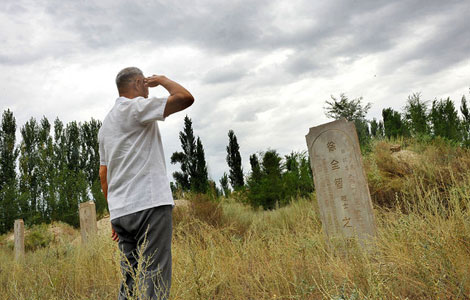Sarkozy, Merkel push euro integration
Updated: 2011-08-17 09:31
(Agencies)
|
|||||||||||
![France's President Nicolas Sarkozy (R) and German Chancellor Angela Merkel react following a news conference at the Elysee Palace in Paris, August 16, 2011. [Photo/Agencies] Sarkozy, Merkel push euro integration](../../images/attachement/jpg/site1/20110817/0013729e48090fb554271e.jpg) |
|
France's President Nicolas Sarkozy (R) and German Chancellor Angela Merkel react following a news conference at the Elysee Palace in Paris, August 16, 2011. [Photo/Agencies] |
PARIS - France and Germany unveiled far-reaching plans on Tuesday for closer euro zone integration and said joint euro bonds may be a longer-term option, leaving the currency area vulnerable to more attacks from traders.
Under heavy pressure to restore confidence in the euro zone following a dramatic market slump, President Nicolas Sarkozy and Chancellor Angela Merkel stopped short of increasing the bloc's rescue fund but vowed to stand side-by-side in defending the euro and laid the groundwork for future fiscal union.
Their message was that the focus should be on further economic integration rather than signing bailout cheques, and suggested that straying from euro zone rules and fiscal targets would no longer be tolerated.
"We have exactly the same position on euro bonds," Sarkozy told a joint news conference with Merkel after their talks.
"Euro bonds can be imagined one day, but at the end of the European integration process, not at the beginning."
But many experts said the measures would fail to assuage markets, which believe a common bond is the only way to ensure affordable financing for euro zone members struggling with debt.
US stocks dropped more than 1 percent and the euro slid as the proposals failed to ease worries about a debt crisis markets fear is spreading to the euro zone's core. Traders had hoped for signals that the issuance of common euro bonds, or an increase of the EFSF, were live options.
"This meeting is all stick - fiscal rule enforcement - and no carrot - a pooling of fiscal resources via a common bond," Rabobank strategist Richard McGuire said.
The statement by the two leaders reflects deep hostility, among voters in northern Europe tired of bailing out the south at a time of austerity at home. That is particularly true in Germany, where growth slowed to almost zero in the second quarter.
"Anyone expecting this meeting to launch euro bonds was not paying attention to the state of political opinion or indeed to the kind of compromises needed for that to happen," said Julian Callow, senior economist at Barclays Capital in London.
"ECONOMIC GOVERNANCE"
In a further rap to financial market players, whose panic-selling this month wiped some $4 trillion off global stocks and sparked a temporary ban in Europe on short-selling, Sarkozy and Merkel also proposed taxing financial transactions.
In plans to be sent on Wednesday to European Council President Herman Van Rompuy, the two leaders want a president to be elected to represent the euro zone and twice-yearly meetings of the leaders of the embattled 17-nation bloc.
In one of the most far-reaching ideas, Sarkozy said the French and German finance ministers had been asked to prepare proposals aimed at having a common corporate tax base and tax rate in France and Germany from 2013. He said the two countries would keep a closer track of each others' economic outlooks.
Analysts queried the feasibility of a financial transaction tax, which was an unexpected proposal, given opposition from some European countries and the European Central Bank.
Callow said that while markets needed to see "more flesh on the bones" of the proposals, it was significant that the two leaders had broken into the August holiday period to meet.
"They are pledging a commitment to economic governance which is a step forward and there is also a commitment to a debt brake, although it remains to be seen whether that will be significantly strong," he said.
"Each side is surrendering some sovereignty which in the end could pave the way to much closer political union and so prepare the ground for the issue of euro bonds."
The full details of the written proposals to Van Rompuy will be made public on Wednesday, Sarkozy's office said.
Hot Topics
The European Central Bank (ECB) held a conference call late on Sunday ahead of the market opening, pledging the ECB will step in to buy eurozone bonds with efforts to forestall the euro zone's debt crisis from spreading.
Editor's Picks

|

|

|

|

|

|







